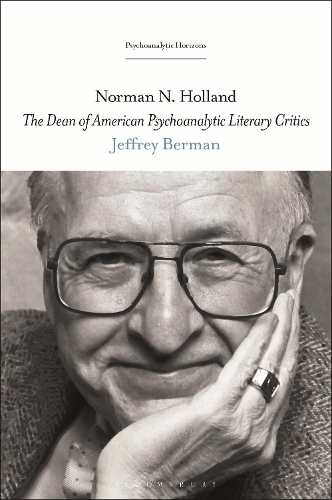
Norman N. Holland: The Dean of American Psychoanalytic Literary Critics
(Hardback)
Available Formats
Publishing Details
Norman N. Holland: The Dean of American Psychoanalytic Literary Critics
By (Author) Jeffrey Berman
Bloomsbury Publishing PLC
Bloomsbury Academic USA
11th March 2021
11th March 2021
United States
Classifications
Tertiary Education
Non Fiction
Psychoanalytical and Freudian psychology
801.95092
Physical Properties
Hardback
296
Width 140mm, Height 216mm
490g
Description
Norman Holland was unquestionably the leading 20th-century American psychoanalytic literary critic. Long known as the Dean of American psychoanalytic literary critics, Holland produced an enormous body of scholarship that appeals to both neophytes in the field and advanced researchers, many of whom have been influenced by his writings. Holland was one of the first proponents of reader-response criticism, the theorist of readers identity themes, and the author of fifteen books that have become classics in the field. Jeffrey Berman analyzes all of Hollands books, and many of his 250 scholarly articles, highlighting continuities and discontinuities in the critics thinking over time. A controversial if not polarizing figure, Holland is discussed in relation to his closest colleagues, including Murray Schwartz, Bernard Paris, and Leslie Fiedler, as well as his fiercest critics, among them Frederick Crews, David Bleich, and Jonathan Culler, creating a dynamic and personal portrait. Insofar as this text illuminates the evolving mind of a premier literary critic, it produces a parallel profile of the American reader, the primary object of Hollands extensive work.
Reviews
Jeffrey Bermans brilliant critical biography of Norman Holland is a major contribution to the history of 20th-century criticism and should be on the desk of anyone interested in how the debates about the function and meaning of literature shifted during this tumultuous period. Comprehensive, well-written, and as engaging as Norman Holland was as a critic and a personality. * Sander L. Gilman, Distinguished Professor of the Liberal Arts and Sciences, Emory University, USA, and author of Stand Up Straight! A History of Posture *
Jeffrey Berman has accomplished an immense task; he has written an appealing and very personal study of Norman Holland, engaging with his subject in a way that both elaborates convincingly the unusual trajectory of Hollands career as the leading psychoanalytic literary critic of the sixties and beyond, but also takes issue with some of Hollands positions. Meticulously engaging Holland extensive oeuvre, Berman moves through the various stages of Hollands criticism from new critical to psychoanalytic to his final commitment to reader response theory, celebrating Holland's achievement but also pointing out Hollands contradictions and weaknesses. Indeed, Berman analyzes Holland not only as a critic but as a person, reading for example, Hollands interpretations of Shakespeare as projections of Hollands own personality. Even more unusual, Berman establishes a personal relationship with Holland during the course of the book describing his own personal encounters with Holland as an undergraduate student and later as a fellow academic to whom he felt close. Finding his subject witty, engaging, insightful, playful, but also at times condescending and cutting, Berman presents an extraordinary personal and complex portrait of an extraordinary and complex critic as well as a comprehensive tour of his works. * Claire Kahane, Professor of English Emerita, University at Buffalo, USA *
Author Bio
Jeffrey Berman is Distinguished Teaching Professor of English at the University at Albany, State University of New York, USA, where he has been teaching since 1973. He is the author or coauthor of more than twenty books, including Confidentiality and Its Discontents, coauthored with Paul Mosher, which received the 2017 Book Prize from the American Psychoanalytic Association. An Honorary Member of the American Psychoanalytic Association, he was selected by the Princeton Review in 2012 as one of the countrys top 300 professors.
